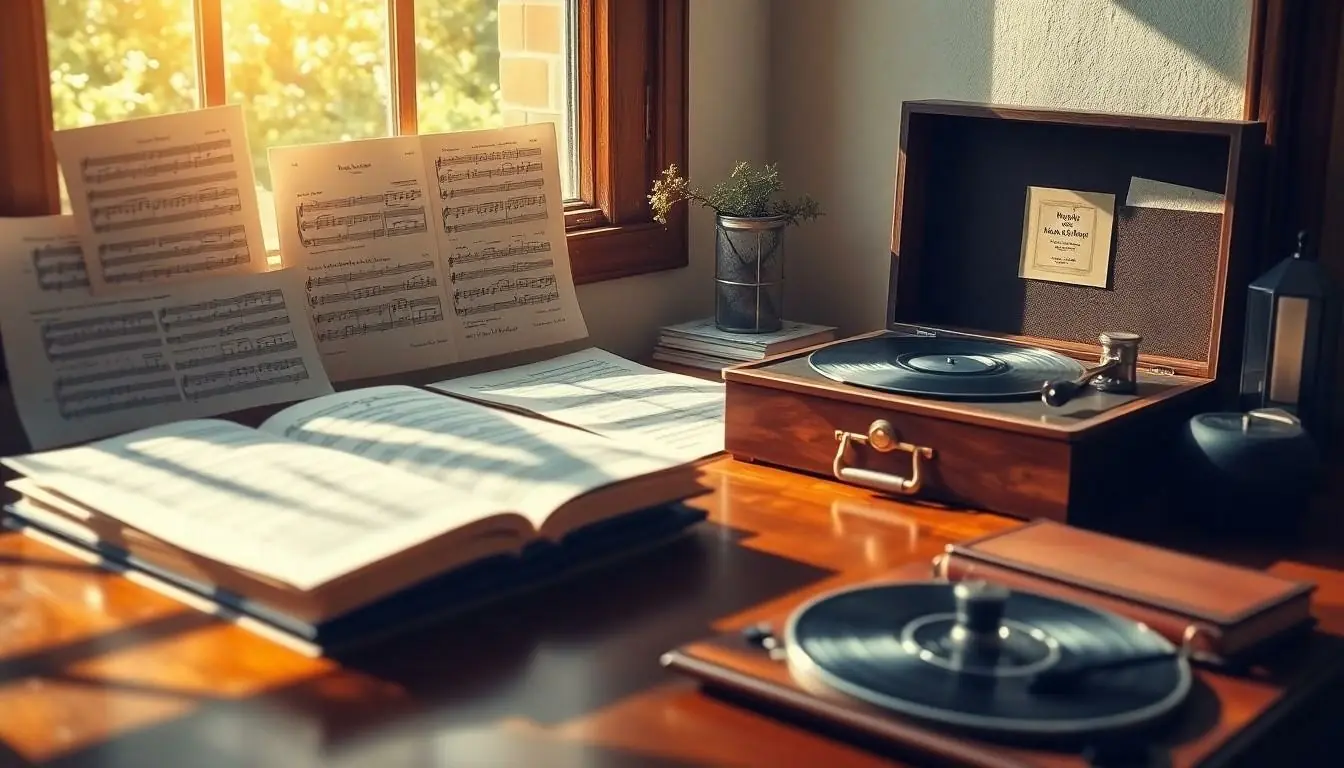Picture this: you’re buried under a mountain of textbooks, coffee in hand, and the clock is ticking. What’s missing? The right soundtrack to boost your focus and creativity. Classical music isn’t just for fancy concert halls or sophisticated dinner parties; it’s the secret weapon of students everywhere.
Table of Contents
ToggleBenefits of Classical Music to Study
Classical music offers numerous advantages for students seeking to enhance their study environment. It significantly supports focus, concentration, and overall well-being.
Enhancing Focus and Concentration
Research shows classical music, particularly compositions with a moderate tempo, fosters an optimal study atmosphere. Students often experience heightened concentration while listening to piano sonatas or symphonies. Such music minimizes distractions, allowing individuals to delve deep into complex subjects. Establishing an auditory backdrop helps maintain cognitive engagement during lengthy study sessions. In many cases, classical pieces serve as cues for the brain, signaling a shift into focus mode.
Reducing Stress and Anxiety
Listening to classical music can effectively reduce stress and anxiety levels among students. Soft melodies and harmonious arrangements create a calming environment conducive to learning. Physiological responses, like a decrease in heart rate, accompany the soothing effects of this music genre. Engaging with symphonies often leads to improved emotional regulation, helping students approach their studies with a clearer mind. Combining classical compositions with study routines can create a more balanced and serene academic experience.
Recommended Classical Music Pieces

Classical music offers various selections that enhance study sessions. Below, notable pieces in two categories shine for their effectiveness.
Baroque Selections
Baroque compositions, with their structured rhythms and intricate melodies, create an ideal study backdrop. Bach’s Goldberg Variations foster concentration through their engaging yet calming motifs. Vivaldi’s Concerto for Strings in G Major energizes study environments without overwhelming listeners. Pachelbel’s Canon in D provides a serene flow, perfect for focusing on complex tasks. These selections encourage a deep connection with material while minimizing distractions.
Romantic Favorites
Romantic music, known for its emotive power, complements study habits beautifully. Chopin’s Nocturnes offer soothing melodies, enhancing concentration and emotional clarity. Clara Schumann’s Piano Concerto in A Minor invites creativity and inspiration, making it a favorite among students. Tchaikovsky’s Swan Lake Suite instills a calming atmosphere, perfect for long hours of focused reading or writing. Each piece serves to support an enriching study experience, yielding beneficial results.
How to Create the Perfect Study Playlist
Creating an effective study playlist requires careful consideration of musical elements. Different tempos and moods can influence concentration levels, making this an important aspect of the playlist.
Choosing the Right Tempo and Mood
Select compositions with a moderate tempo to enhance focus. A tempo between 60 to 80 beats per minute promotes an optimal study atmosphere. Music at this pace fosters a calming environment, allowing for improved comprehension and retention of information. Additionally, choosing pieces with a serene mood can reduce distractions. Pieces like Bach’s Goldberg Variations provide structured rhythms that support sustained attention. Emphasizing calming motifs can also aid emotional regulation, making it easier to tackle complex subjects.
Mixing Genres and Composers
Diversifying genres and composers can enrich the study experience. Combining Baroque and Romantic selections balances structure and emotion effectively. Integrate works from various composers like Vivaldi and Chopin to keep the playlist fresh and engaging. Spanning different styles preserves interest during longer study sessions. Consider creating a mix that includes pieces like Pachelbel’s Canon in D alongside Clara Schumann’s Piano Concerto. This variety enhances emotional clarity while maintaining a tranquil backdrop, allowing for a deeper connection with the material.
Studies and Research on Music and Learning
Research supports the idea that classical music enhances academic performance. A study by the University of Florence found students exposed to classical music during exams demonstrated higher retention rates and improved problem-solving skills. Compositions with moderate tempos, specifically between 60 to 80 beats per minute, cultivate concentration and minimize distractions.
Further findings from Stanford University indicate that music activates brain areas responsible for memory and complex reasoning. Incorporating classical music into study routines fosters a conducive learning environment where emotional regulation and clearer thinking thrive. Such environments reduce stress, making it easier for students to engage deeply with challenging material.
In a survey conducted by the Music Research Institute, 70% of participants reported improved focus when studying with classical selections. Baroque pieces, like Bach’s Goldberg Variations, significantly stand out in these reports, noted for their structured rhythms. Participants favored these compositions, attributing their success to a calming influence that helped maintain attention.
Moreover, another study revealed that students who listened to classical music while studying showed a greater appreciation for the material studied. Emotional connections formed through music enhance overall comprehension. Combining different genres, like Baroque and Romantic, keeps students engaged, increasing study session effectiveness.
Students should consider crafting personalized playlists, integrating pieces known to stimulate cognitive abilities. Selecting varying composers and styles, while sticking to a moderate tempo, bolsters creativity and emotional clarity. By doing this, students can optimize their study time, leading to a more productive and enjoyable academic experience.
Integrating classical music into study routines can transform the academic experience. The right compositions not only enhance focus but also create a calming atmosphere that supports emotional well-being. By selecting pieces with a moderate tempo and mixing genres, students can maintain engagement while minimizing distractions.
As research highlights the positive impact of classical music on retention and problem-solving skills, it becomes clear that these selections are more than just background noise. They serve as powerful tools in fostering a productive study environment. Embracing this approach can lead to greater academic success and a deeper appreciation for the material being studied.



